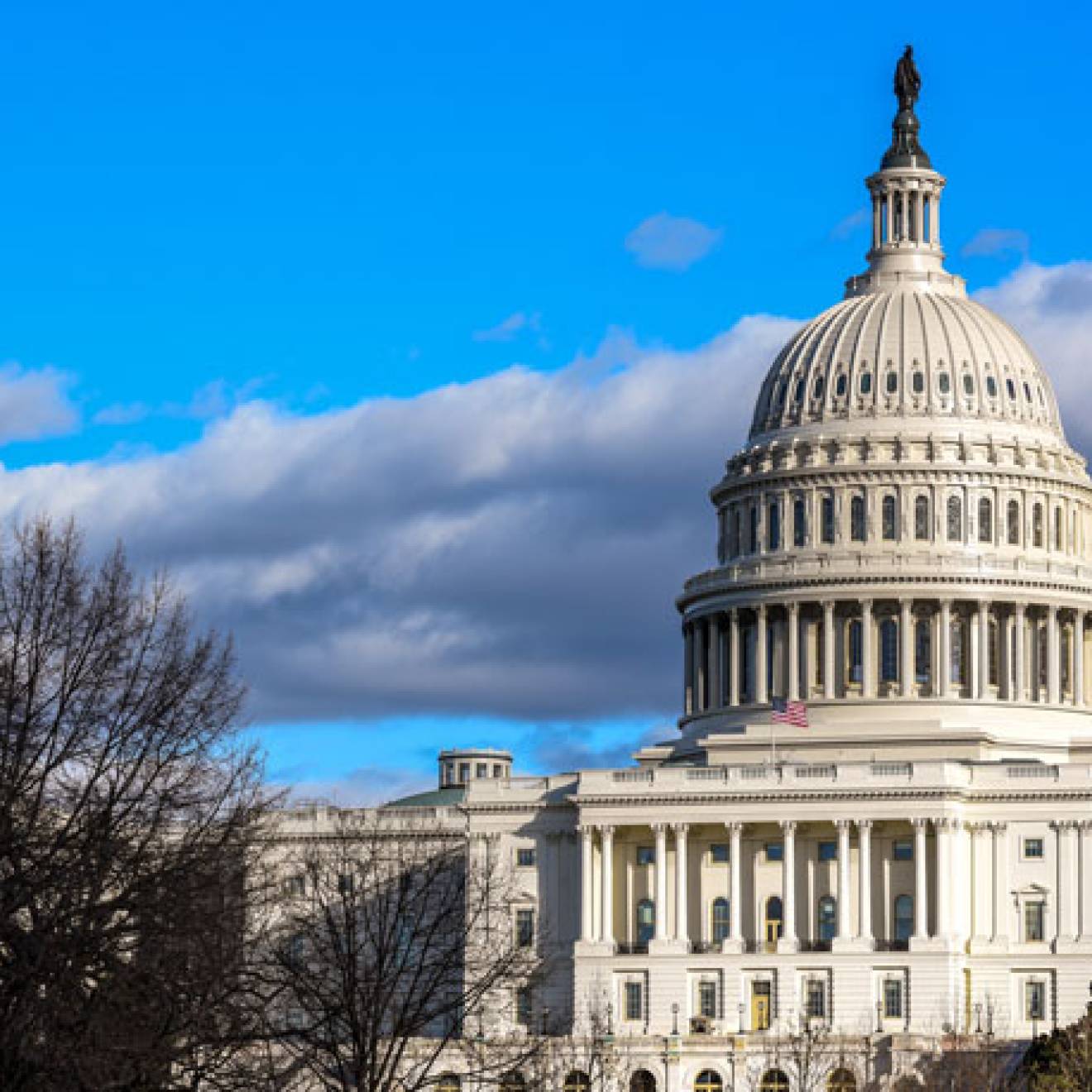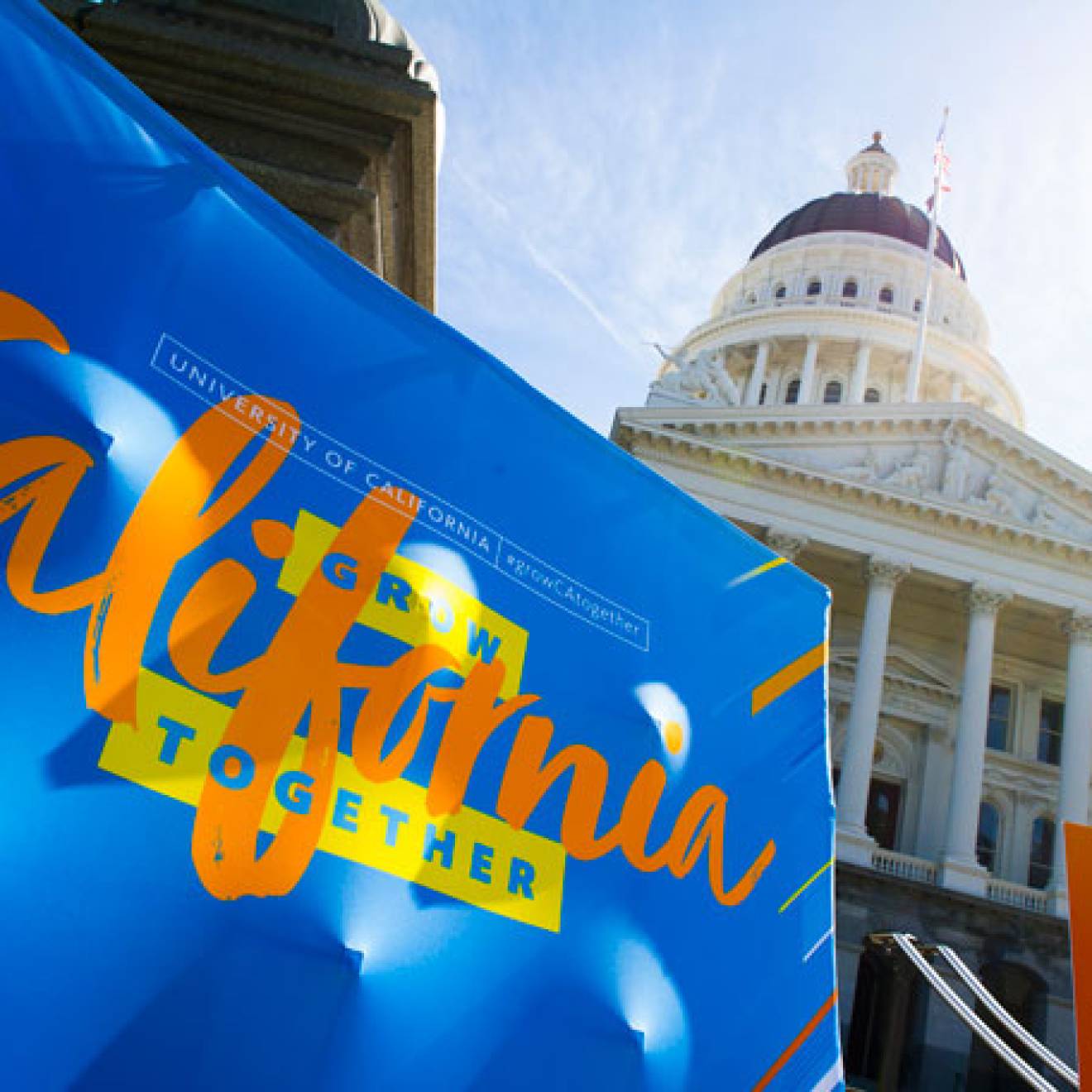Nicole Freeling, UC Newsroom
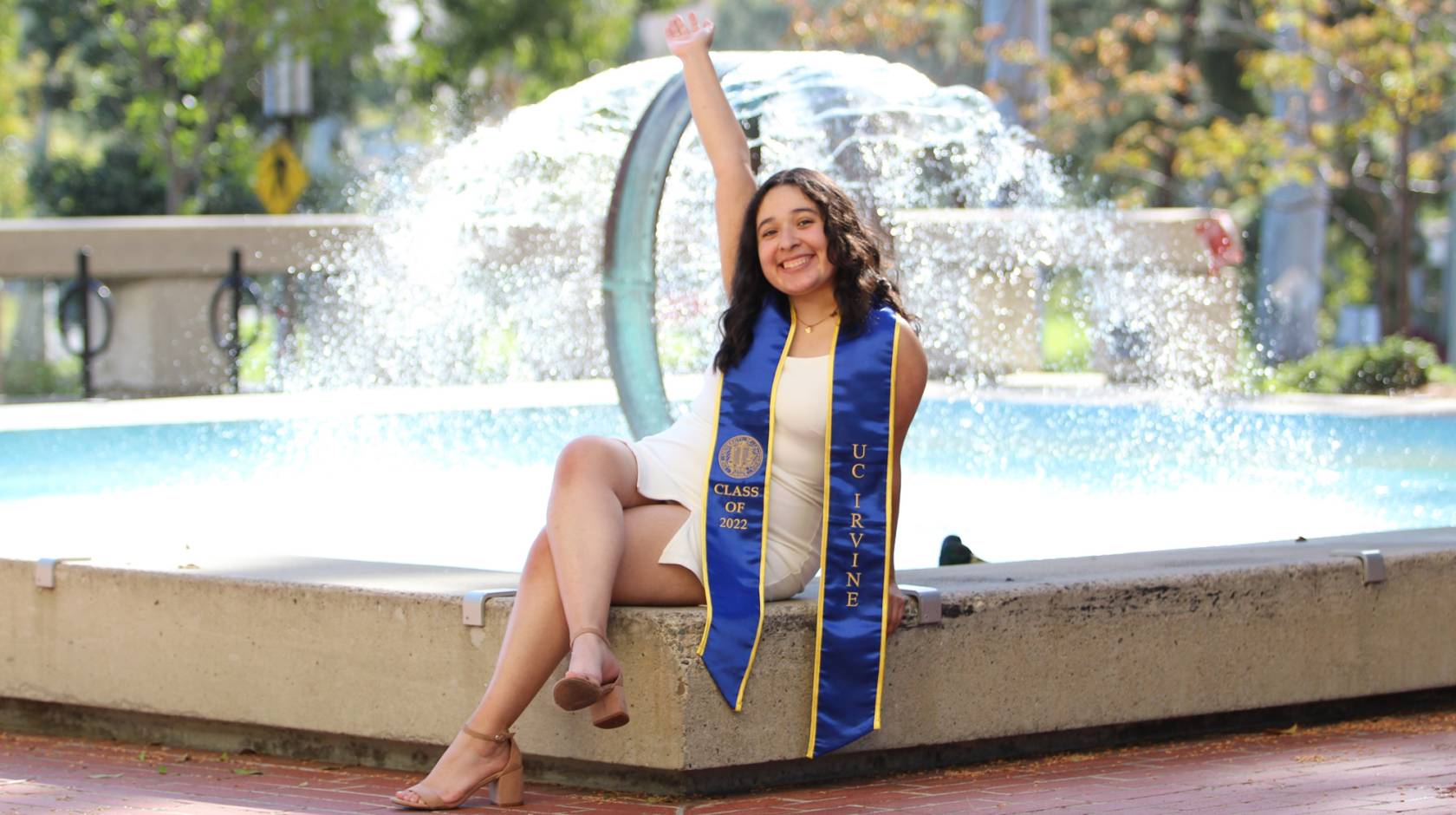
Navigating college during a global pandemic has done nothing to dampen the tenacity and ambition of UC’s undauntable new grads. Now they’re ready to put their brilliance to work in ways that will make the world better for all of us.
—
“This is for my mom. She put in so much work for me to have the privilege and opportunity to pursue higher education.”
That’s Lili Castillo, a UC Irvine mechanical engineering major and one of roughly 87,000 students this year whose lives will be transformed by the power of a UC degree.
Like so many others in the Class of 2022, Castillo faced incredible challenges over the last few years but never gave up on the life-changing dream of becoming a UC graduate.
Reflecting with gratitude, she and others share, in their own words, how they got here and what comes next.
For some, their diploma marks the culmination of a journey that started years earlier, with parents who crossed borders in the hopes of providing their children a better life. For others, it is proof of the power of determination to triumph over adversity, the evidence that it is never too late to get a college education and aim for a fresh start.
One thing these grads have in common: A federal Pell Grant helped put college in reach. As the Pell Grant marks its 50th anniversary this month, more than 28,000 of UC’s newest college graduates are proof positive that Pell Grants change lives.
Here are a few of their stories.
Lili Castillo, UC Irvine
Mechanical engineering major
Hometown: Carlsbad, Calif.
This is for my mom. She put in so much work for me to have the privilege and opportunity to pursue higher education. Seeing her work those long hours and being able to show her what it led to makes it all worth it.
Some of my peers in engineering were the only ones in their family without a Ph.D. My mom is a house cleaner. For five years of my life, we lived in a garage. We used to pick up recyclables just to make ends meet and clean our church restrooms for extra cash.
Tackling imposter syndrome was about realizing I add value to engineering because I’m bringing in new mentalities, new mindsets, new attitudes, and beliefs that haven’t been fully explored.
I became president of the Society of Women Engineers right as the pandemic hit. That was one of the scariest and most exciting moments of my life. At the end of the year, we applied to the Anteater Awards, and we were named organization of the year.
Being surrounded by so many empowering women through the Society of Women Engineers really instilled the fact that if they could do it, I can do it, and we’re here to support each other and lift each other up.
Now I know I’m what an engineer looks like. I’ll be pursuing a Ph.D. in engineering education systems and design at Arizona State University, with a National Science Fellowship. I’m also going to be presenting at the leading conference in my industry.
I’m a strong believer that there is still some work to do in terms of representation for the Latin community, for women and for other identities within engineering. By pursuing a professorship I'm creating a way to access these new and emerging cohorts of engineers.
It wouldn’t have been possible without the Pell Grant. Investing in Pell is investing in people with the drive, the passion, the tenacity and grit to overcome obstacles and limitations. It is investing in a new future.
Liliana Lara Hazel, UC Davis
Sociology and political science public service
Hometown: Soledad, Calif.
I grew up in a small, rural agricultural town in the Salinas valley. I’ve always loved to learn.
I took the SAT when I was in seventh grade as part of a college prep program through Johns Hopkins University. Whoever scored high enough was offered scholarships to their Center for Talented Youth summer program.
I attended that summer program as a scholarship student three years running. It was a huge independent experience for me, going on an airplane, being on a college campus and taking college-level courses. It made me realize that I didn't want to stay in my small town. I wanted to branch out and see things.
UC Davis was a big change. I went in as a psychology major. But I struggled in my classes and actually was dismissed after two quarters. I retook two classes in the summer after my freshman year and went from Fs to As. I reapplied and was readmitted.
What really helped me was I needed to have the time to take one class each summer session and fully devote myself to those classes.
I recognized that I couldn't ignore my having a learning disability, ADHD, or attention-deficit/hyperactivity disorder. Once I was back on campus, I met with the student disability center, and they really helped me learn how to advocate for myself. It really came down to me learning my needs and my habits and how my brain works.
I ended up double majoring in sociology and political science, with a focus in public service. I got a job as a student outreach assistant for the Early Academic Outreach Program and I’m graduating as a student manager from the same program.
I definitely feel like I’ve come into myself. In high school I was influenced by other people’s opinions. Coming to college, I was definitely pushed out of that comfort zone. I learned to stand my ground, speak up for what I believe, and communicate my own thoughts and ideas.
One thing that hasn’t changed is I’m still a lifelong learner. I love books. I love movies. I love music. And I love asking the “but why” questions.
Without federal aid, there's no way I would have gotten here. Investing in the Pell Grant isn’t investing in something anonymous — it’s investing in students’ lives. You’re investing in the future of people with unique perspectives that might not otherwise be heard or seen.
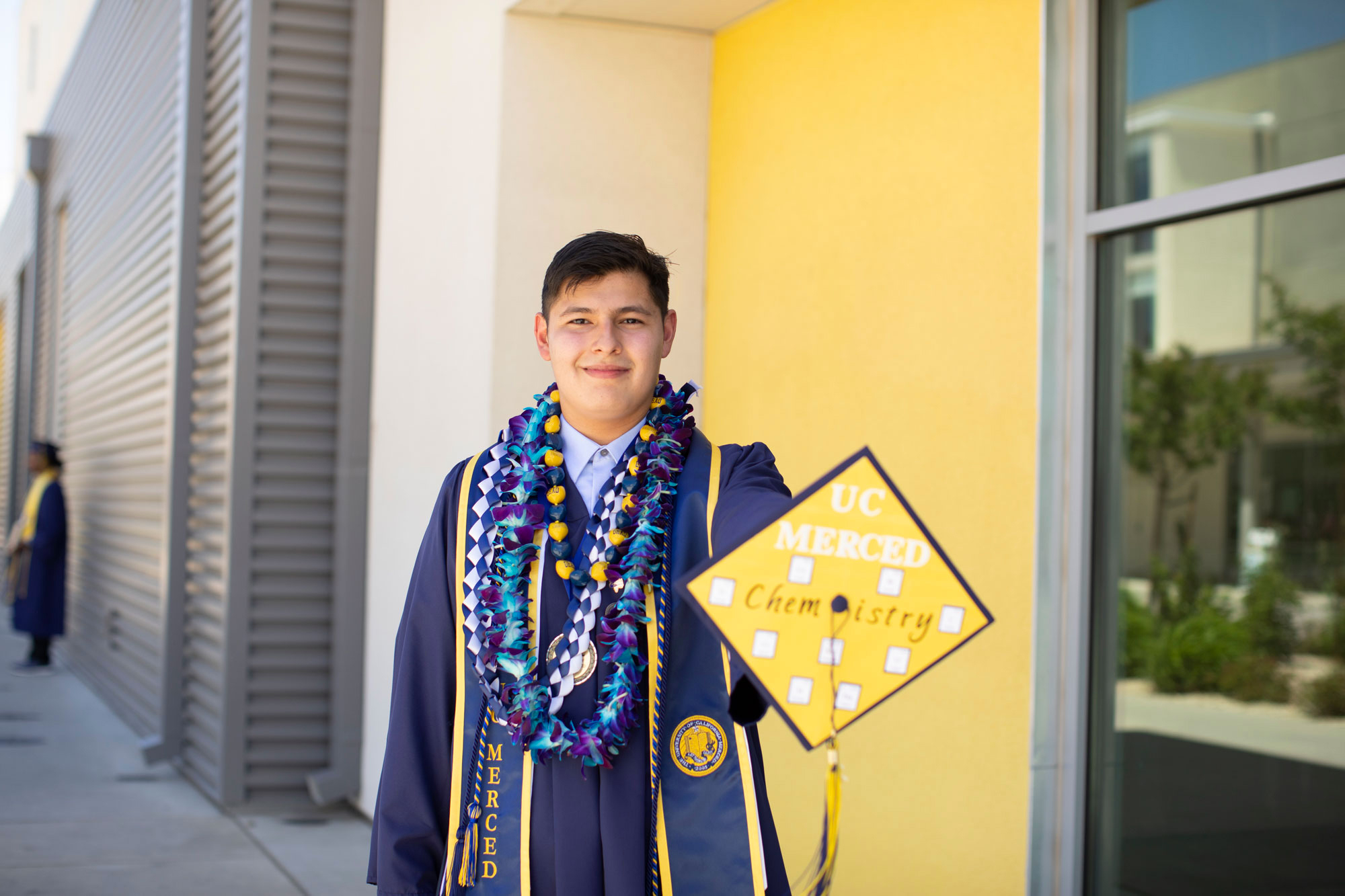
Anthony Alfaro, UC Merced
Chemical sciences
Hometown: Carlsbad, Calif.
I wouldn’t change anything about my four years at UC Merced. I've had so many opportunities: teaching chemistry, being able to work with first-generation, low-income college students as a peer mentor and being an assistant in a research lab.
My parents didn’t go to college but they always told us that higher education equals success. Originally, I thought I would become a doctor, because what family wouldn't be proud of a kid who goes to medical school? But I realized I did not like biology, I do not like practicing medicine and that path wouldn’t make me happy.
But I started doing research and working in the chemistry labs and that was my place! Whenever I was there, I was in the zone. I could be in a lab for hours and I wouldn't get bored. Then I learned about graduate school, and it was like — this is perfect.
I majored in the chemical sciences with an emphasis in biological chemistry. I found a new passion for organometallic chemistry and sustainable catalysis, which is the type of chemistry that looks at synthesizing complexes with metal centers and organic ligands and studying what kind of reactions they could help catalyze.
I was part of a pilot program where undergrads could go during lectures to help the professors teach their class. I found out I love teaching, especially teaching chemistry. It’s a hard subject that lots of kids hate, but I feel like I’m able to make it more accessible and more enjoyable. It’s so exciting to me and I try to share that with people.
At graduation, my dad was like, “You were just graduating high school and you’re already a scientist. We have a chemist in the family.” He was so very proud. It was an emotional day.
I tell my students to trust yourself, know your worth and know that you're good enough. Do something you're passionate about and go for it. They say if you’re working and you’re happy then you're not really working — and that’s how I feel when I’m in the lab.
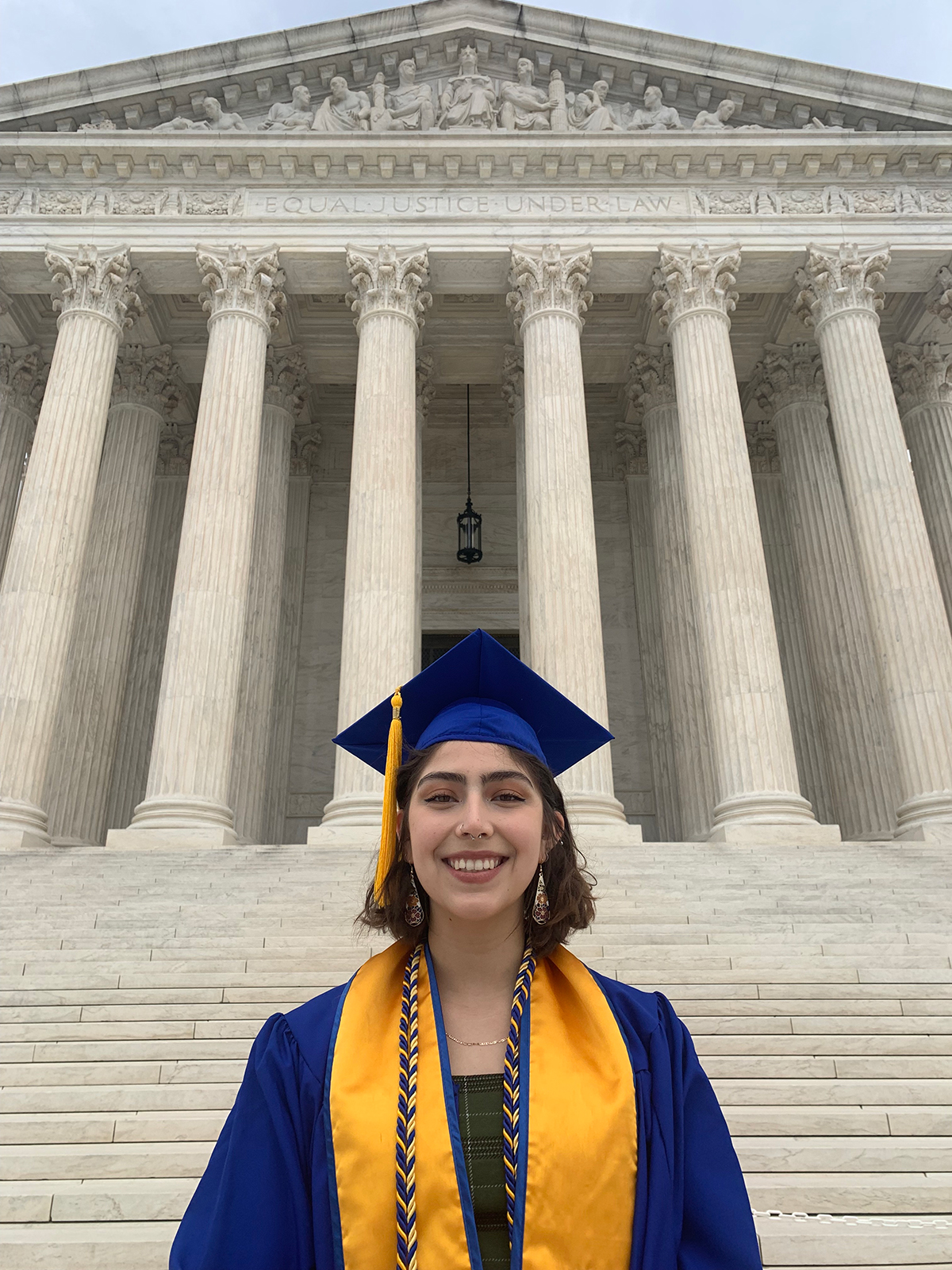
A rough first year didn’t keep Liliana Lara Hazel from thriving at UC Davis.
Esme Quintero-Cubillan, UC Santa Barbara
Political science and government
Hometown: Irvine, Calif.
My ancestors and parents worked tirelessly to be resilient, to be strong and to be hopeful. I am the culmination of their love, hope and resilience. It’s my job to fight to gain my education, to pursue a better life, so I can give a better life to the generation after me.
In high school, I faced a lot of obstacles related to [being] queer and trans. When you're busy struggling to survive, it's hard to think about AP bio class.
I graduated high school with a 2.7 GPA and was told by my high school counselor that I shouldn't expect to go to college. That lit something within me.
I knew that I wanted a better life and the opportunity to make something of myself. I attended three California community colleges and got three associate degrees for transfer.
At UC Santa Barbara, I began to get really involved. I founded my own sorority for queer and trans students of color. I worked to allocate over $120,000 to basic needs centers. I [also] created a queer and trans people of color emergency fund. Today we’ve distributed over $30,000 in direct aid.
I began seeing how to me, what matters most in this world is that I fight for a future that is more equitable, more just and that leaves future generations better off.
After graduation, I will be joining the ACLU as a fellow in a new program meant to bring marginalized identities into organizational leadership and advocacy work. I was one of three fellows selected out of over 400 applicants.
I have this saying I love: The work we do is not for us, it is for the seven generations after us, as the seven generations before us worked for us.
When I was in high school, I was deeply afraid that I wouldn't be able to achieve much. To this day, sometimes I’m shocked at how far I’ve made it. I’m shocked I’m getting a degree, that I’m the UCSA president. I’m shocked I have the community I have, that I’m living my life truly as a proud trans person.
But more than anything, when I was in high school, I hoped for a better future. I wanted to do something to make the world better, even if the world didn't believe in me and didn't necessarily love someone like me. And here I am, doing that and thriving despite all the obstacles.
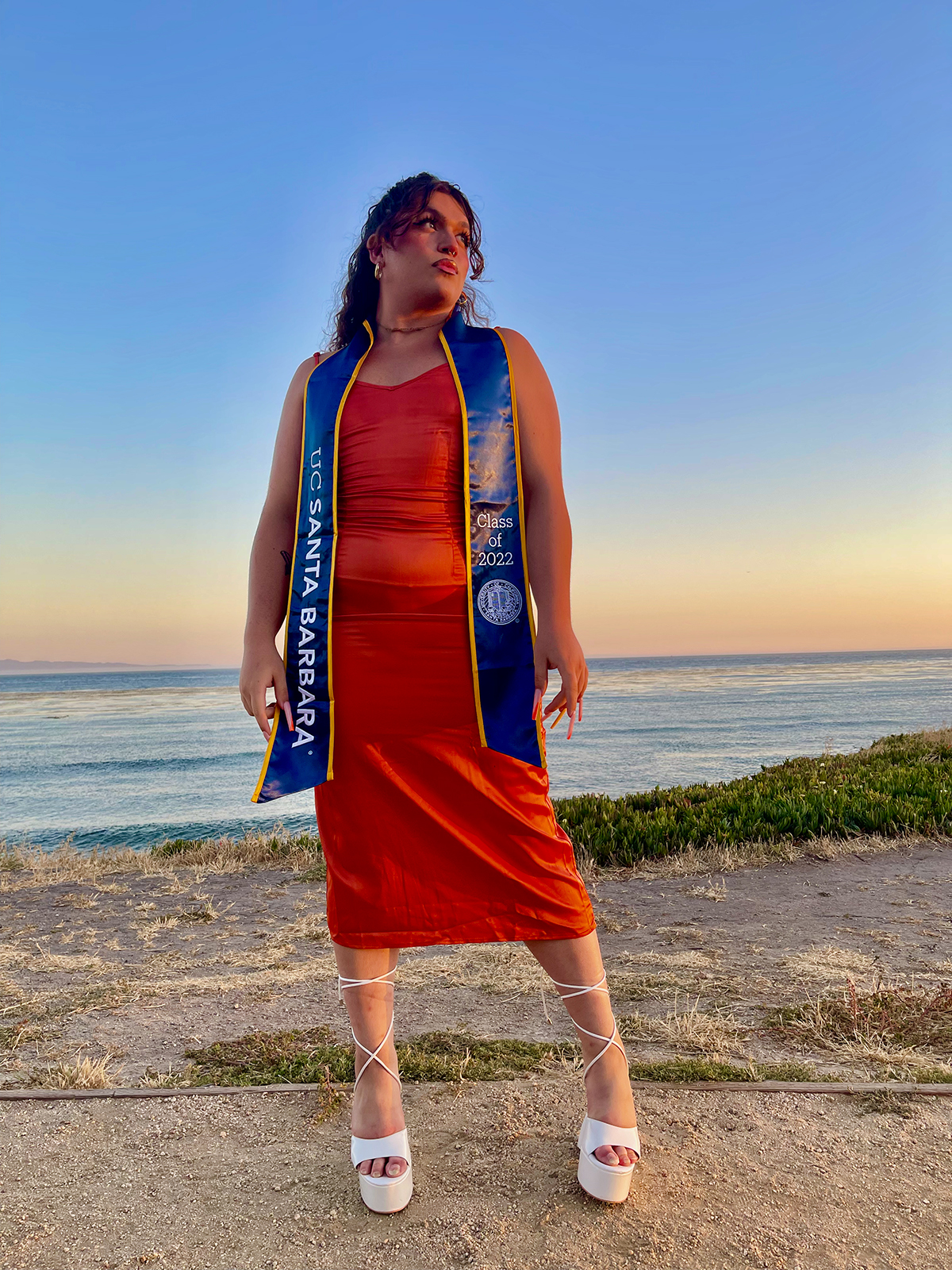
Esme Quintero-Cubillan has been a leader on campus and in the trans community.
Patrosinio Cruz, UCLA
Education and social transformation
Hometown: Sun Valley, Calif.
In high school, I had a really hard time adjusting. I was not good at testing at all. Ultimately, I thought, why don’t I just enter the workforce, instead of going to this school system that makes me feel so dumb?
I dropped out of high school and worked two jobs. Then I got involved in my church and served on a mission in Africa for two years. I was assigned to the Cape Verde Islands, working with the community and helping them learn English and literacy skills. Because of that, I now speak four languages. I grew up speaking English and Spanish, and now I also speak Portuguese and Creole.
My friends in Africa asked me about the [American] educational system and I explained how anyone can go to college and get financial aid. And then it hit me that I really have these opportunities that not everybody gets to benefit from.
After I came home, at 22, I decided to get my GED and enroll in community college. At first I failed my classes because I did not know how to learn.
I became part of UCLA’s Center for Community College Program. They took us to campus and showed us all around the classroom, the dining halls and the libraries. But in between they taught us study habits.
They told us that when you walk into a classroom, act like a scholar, sit in the front of the class. When I went back to my community college, I felt more engaged. I started getting As. I had always been a C student. I had to tell myself, “Oh wow, you're not dumb.”
When I came to UCLA, I felt like I already had a community. The CCCP program raised my vision of what I could do in academia, of what I could become in higher education, and I feel that it would be wrong if I didn't turn around and do that for the next cohort of students like me.
Being an RA in a Chicanx/Latinx living learning community has also been very special. I have 200 students that I look out for, that come to me for advice. I’ve seen their confidence skyrocket from the first day that I met them.
The Pell Grant helped me believe that college is accessible. I majored in education and social transformation because I want to help students like me who hated school but love education. I specifically want to do research that focuses on high school dropouts and pathways that can bring them back into higher education.
One thing I hope I’ve contributed is to normalize the experience of being an older, non-traditional student. I hope that I can take my own life and trajectory into the workforce to connect with the community that I want to serve. I have the credentials that I know what they’re going through. I made it here and they can too.
Read more about his journey at UCLA here.
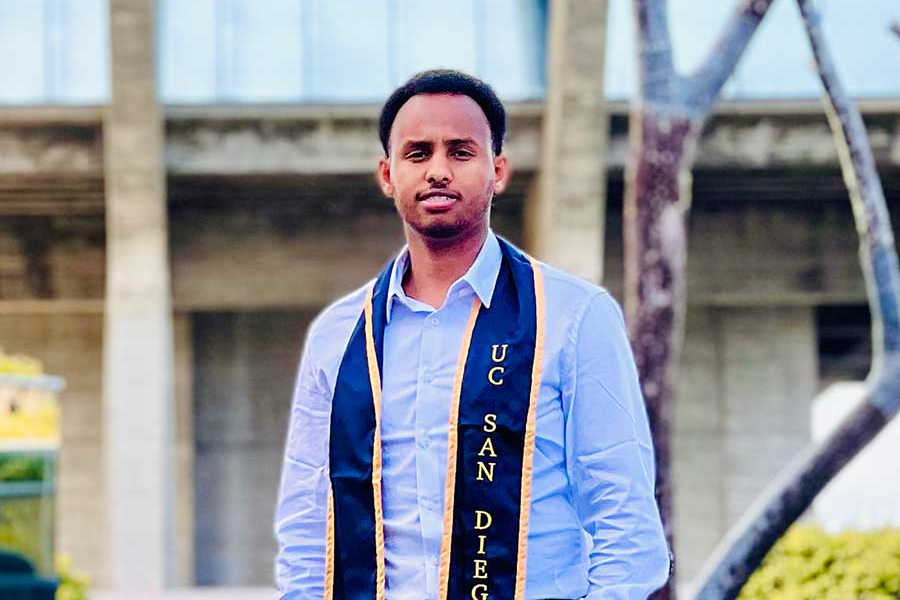
Salad Omar, UC San Diego
Economics
Hometown: Jijiga, Ethiopia
(Excerpted from UC San Diego news. For full story, read here.)
For as long as he can remember, Salad Omar was told by his mother that he would earn a college degree one day. As a woman growing up in Somalia, Omar’s mother never learned to read or write. Yet she wanted a better life for her children; with her help and guidance, Omar is fulfilling that dream.
Omar was raised in the Ethiopia. “I came to the United States in 2017 as a refugee; I didn’t know how to take the bus or use a GPS.”
“Seeing a blind man go to work every day and visiting him gave me the hope I needed to know that I can overcome every challenge as I become someone who helps my family.”
Omar began attending community college in 2018, where he started to believe in himself. He remembers working long hours as an Uber driver while enrolled full-time and would often pick up UC San Diego students. Despite the odds stacked against him — language and cultural barriers, his educational background, being the first in his family to attend college — Omar transferred to UC San Diego in 2020, where he was welcomed by a diverse research community.
And Omar’s friends from all over the world — Korea, Germany, China — believed in him wholeheartedly. While the vast cultural exchange was unexpected, Omar shared that it was one of the things he loves most about UC San Diego.
“We came to the U.S to have a better life since our home country is not stable and doesn’t have a functioning government. And now I’m here graduating from one of the best universities in the world and becoming a U.S. citizen.
“I’m where I dreamed I would be four years ago, thanks to my mom and everyone who supported me along the way.”
“For some people college is the next step to take and for some people it's a dream come true if they can afford it. Having a Pell Grant allowed me to afford UC San Diego and made that impossible dream of my mother’s come true.”
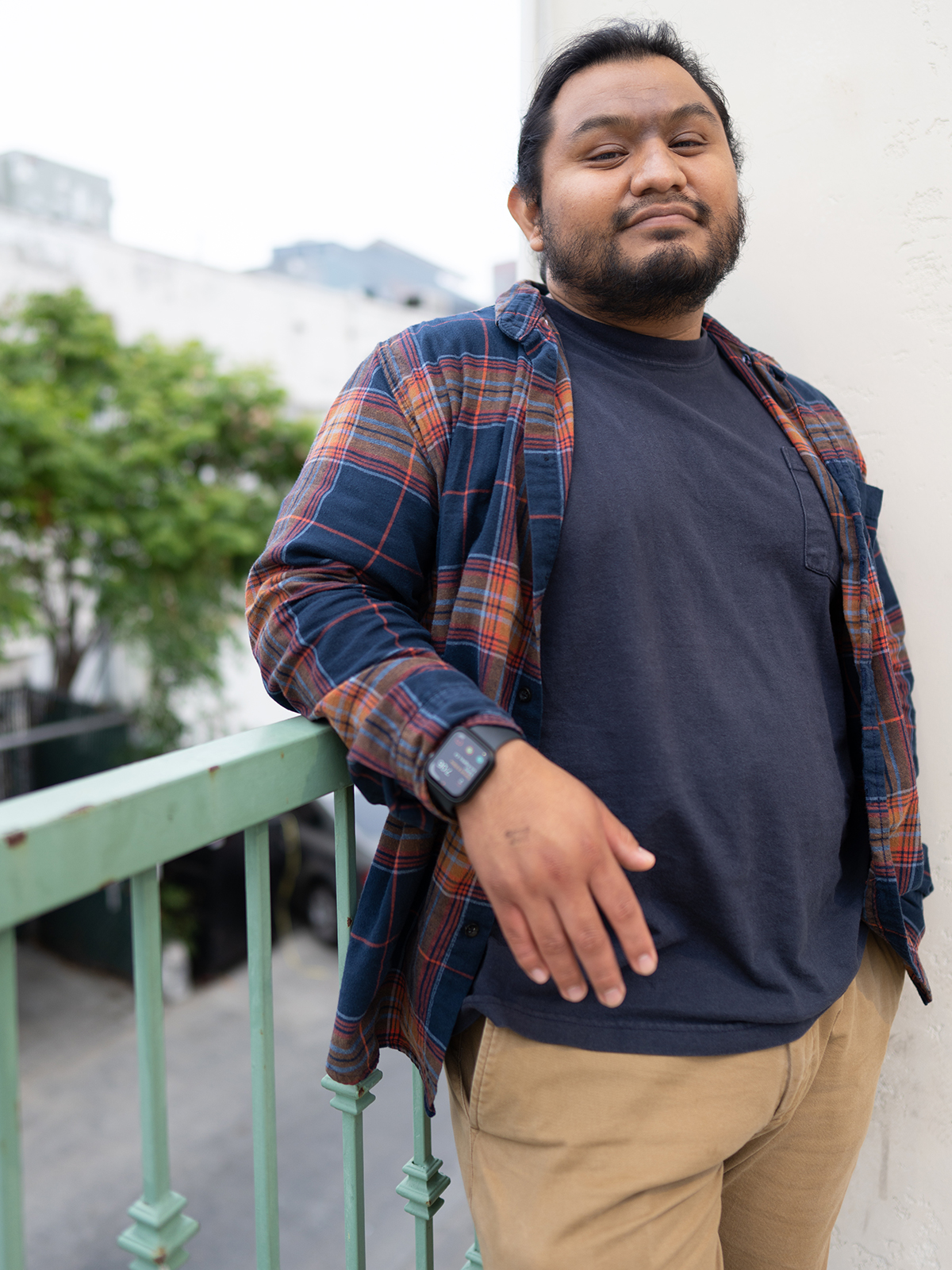
Patrosinio Cruz wants to build supports for students like him, who “hate school” but love education.
Sheridan Cetera, UC Riverside
Theatre, film and digital production
Hometown: Antelope Valley, Calif.
During my years at UC Riverside, I’ve come to realize how much I really love and appreciate education. I always valued education in order to function as a basic human being in our society, but I felt college was not a necessary step. I worried I would struggle a lot with academia. Additionally, I wasn’t certain it would be worth it for the cost and time that I would have to dedicate to my studies.
But going to UC Riverside and getting the experience to work with professionals in the acting industry and people who’ve studied this for their whole life, I’ve learned so much. I’ve loved all the acting classes and just really indulging in the acting experience, learning different techniques and knowing that everyone is different.
The professors were always there to help. They want the best for the students. It was just a very supportive, comfortable and happy environment.
I’ve also become a lot more mature and a lot more informed about the world. Ultimately, I’ve become a better person. So much of the stuff I’ve learned is vital to living in our society and contributing to positive change and I think that is SO worth the cost and time I’ve put into my studies.
I’m going to be working over the summer as an orientation leader, helping introduce students to the campus and the community and giving them resources. After that, I’m going to become a substitute teacher and then just do as many auditions as possible, and just keep trying to go out there and land any roles I can.
What I love about acting is being able to express myself within a character. You're playing somebody who's not you, but at the same time, they are you — the way that you take on the role and the way that you express the emotions that the characters are going through. I think that's really interesting, and I love being able to express myself in that way.
My advice for incoming students is talk to your professors and academic advisers! Make sure you’re communicating in any way you can, because they want to help you! And the more you put yourself out there, the more opportunities and help you will get.
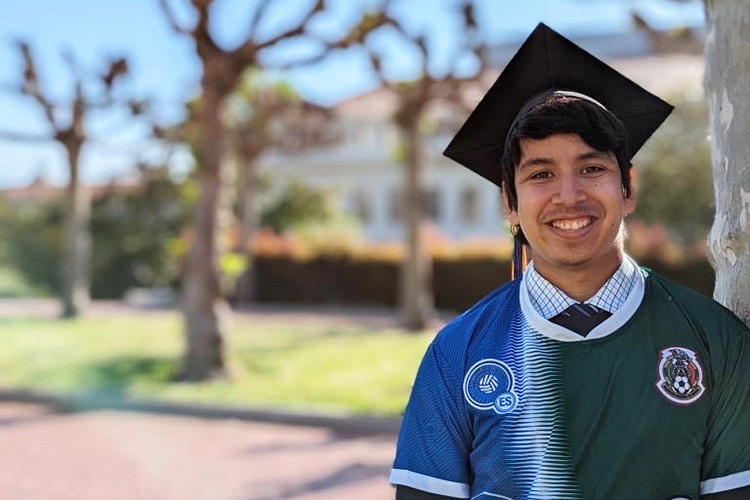
Alberto Ibarra, UC Berkeley
Mechanical engineering
Hometown: Inglewood, Calif.
(Excerpted from UC Berkeley News. For full story, read here.)
When I was a kid, I remember watching my mom water her garden. She put a lot of time and effort into her small, budding rose bushes, treating them with love and rich soil. And every spring, they would bloom with big, vibrant-colored petals in front of our two-bedroom apartment.
Looking back now, those roses were a reminder to me that despite the environment or space that we live in, there is beauty and warmth all around us. Beauty that we can create for others to see.
The first two or so years at UC Berkeley was like a rollercoaster of emotions for me. I was at times anxious, stressed and overwhelmed. It felt like a degree was a far-fetched accomplishment. It was harder than anything I had ever experienced socially, academically and emotionally.
But something that always grounded me was my family and that foundation of love and persistence they gave me as a child. I had all of the traits to succeed, I just needed to allow myself to grow — to be myself, despite the hardships.
After finding my communities on campus, things really started to fall into place for me.
I actively sought to not only challenge myself with rigorous engineering coursework but also establish my footing in research around my interest areas of design, manufacturing and innovation. With the guidance of Dorian Liepmann, my mechanical engineering professor, I began to design microfluidic medical devices in a lab setting as my first research experience.
My design and manufacturing pursuits at UC Berkeley led me to work in life-changing projects in both the BEST Lab and Squishy Robotics. I was able to take part in designing functional, fitted prosthetic hands for the purpose of children’s physical activities, performing 3-D modeling and modifying existing CAD prosthetic hands. I even got the chance to present my work at the 25th Annual National McNair Scholars Symposium.
These experiences have motivated me to continue my studies at UC Berkeley as part of the mechanical engineering graduate program, where I hope to continue to find ways to help people.
Something I am most proud of from my time as an undergraduate at UC Berkeley is the La Loma Rooftop Garden at the Bechtel Terrace Engineering Center. Located on the engineering library rooftop, the garden gives Latinx students and students of color who may have gone through similar challenges or have similar backgrounds a space of their own to practice self-care and self-love.
I may have some scratches and scars, and I may not be the best-looking rose, but I’m still a rose looking up and reaching toward the sky.
Jose Martin, UC Santa Cruz
Film and digital media
Hometown: Santa Maria, Calif.
I grew up the youngest of four siblings in a small town, the barbecue capital of California. After high school, I went to Allan Hancock Community College.
It took me a while to find out what I’m truly passionate about. But finally, I discovered what I love is making film, and also teaching and helping others, especially youth. The amazing film and digital media program drew me to UC Santa Cruz. And of course, I love the campus — it is so beautiful with the beach and the redwoods.
As a transfer student, I did a summer program that gave me a head start and helped me make connections on campus. The dorm I lived in was for transfer students, so we were all a bit older than the rest of the students.
I would say living in the dorms was one of my best experiences in my life so far, interacting with everyone and making my own community. It gave me the opportunity to meet new people and create lifelong friends. Some of them are my housemates now.
Another thing I loved was working in the financial aid office and being able to help other people get the funding for college. I’ve made lifelong friends there and I’ve loved getting that feedback from students and parents about how much my help has meant for them.
I’ve changed so much at UC Santa Cruz. I learned to speak and present myself much more professionally and how to network, which is important to what I want to do with filmmaking.
After graduation, I’m going to work for a nonprofit bicycle coalition, educating elementary school students on how to ride a bike safely and advocating for safer streets for bikers and pedestrians.
Ultimately, I want to start my own nonprofit with film and work with elementary school students from fifth grade to all the way to high school, to teach them how to make their own films. Right now, everyone's videotaping everything in their lives, making video logs, so I want to give kids the tools to do that professionally and effectively, as well as the networking skills to work together on films.
It took some time but getting that diploma and seeing myself on that stage, it is all definitely worth it! My little niece is going to be watching me and hopefully this inspires her to go to college.
And for my parents: you brought me here, you took so much time out of your lives to make my life better, and this is all because of you.
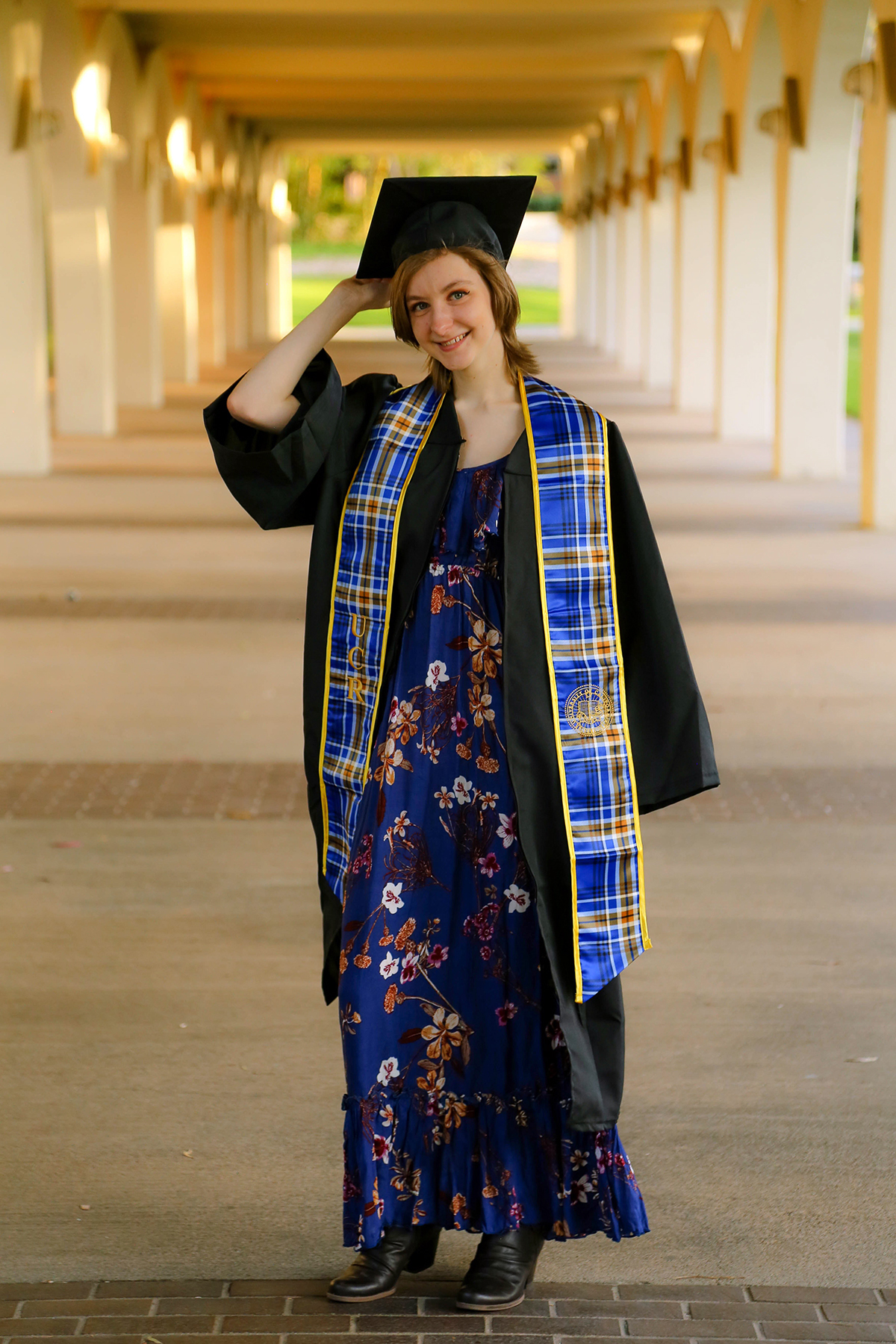
Sheridan Cetera almost didn’t go to college. Now she wouldn’t trade it for the world.
